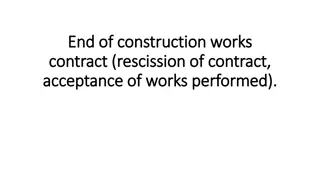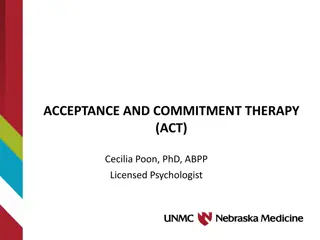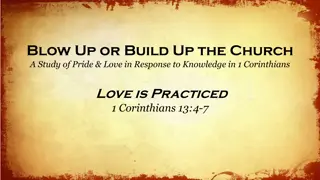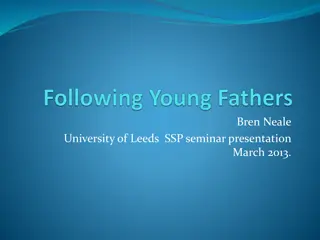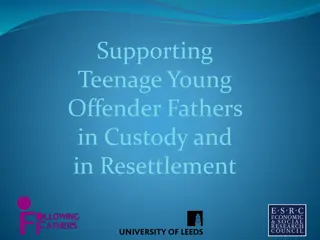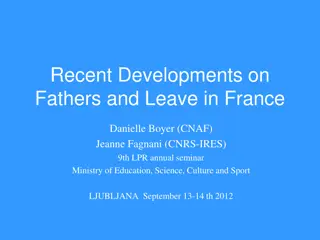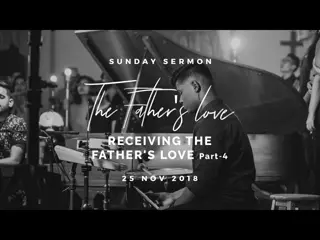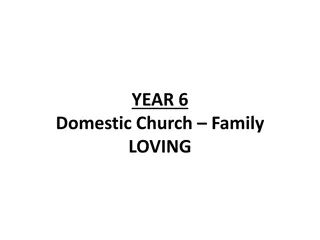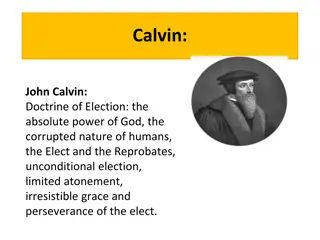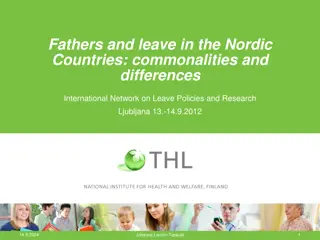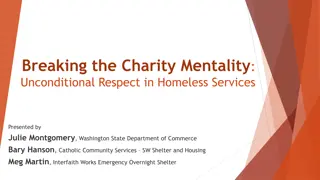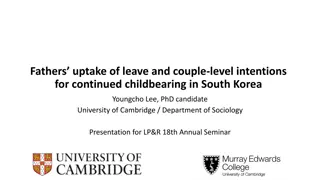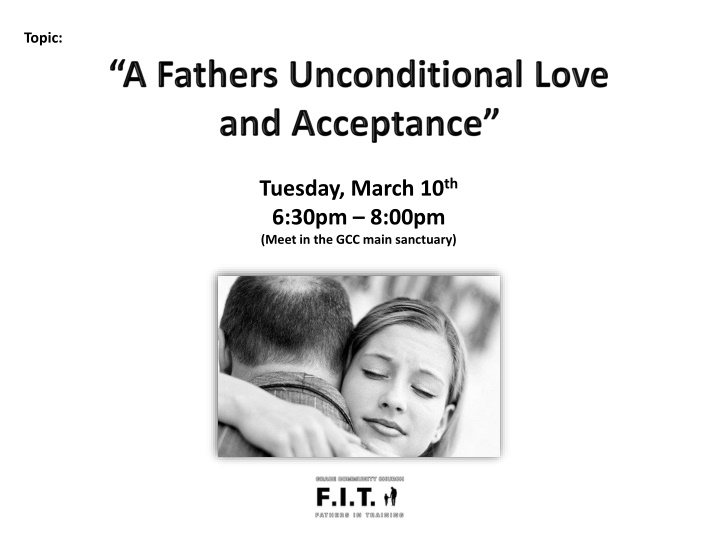
Parable of the Prodigal Son: Unconditional Love and Acceptance
Explore the powerful message of the Parable of the Prodigal Son from Luke 15:11-32, illustrating the themes of unconditional love, forgiveness, and acceptance. Witness the transformative journey of a wayward son welcomed back with open arms by his compassionate father, showcasing the essence of unselfish, benevolent concern for others. Reflect on the profound meaning of unconditional love and acceptance as demonstrated in this timeless tale.
Download Presentation

Please find below an Image/Link to download the presentation.
The content on the website is provided AS IS for your information and personal use only. It may not be sold, licensed, or shared on other websites without obtaining consent from the author. If you encounter any issues during the download, it is possible that the publisher has removed the file from their server.
You are allowed to download the files provided on this website for personal or commercial use, subject to the condition that they are used lawfully. All files are the property of their respective owners.
The content on the website is provided AS IS for your information and personal use only. It may not be sold, licensed, or shared on other websites without obtaining consent from the author.
E N D
Presentation Transcript
Topic: Tuesday, March 10th 6:30pm 8:00pm (Meet in the GCC main sanctuary)
Unconditional (Definition): Not limited in any way; Complete and Absolute.
Love (Definition): strong affection for another arising out of kinship or personal ties; unselfish loyal and benevolent concern for the good of another
Acceptance (Definition): favorable reception; approval; favor.
Unconditional Love and Acceptance (Definition):Unselfish loyal and benevolent concern for the good of another that is complete, absolute, not limited in any way and demonstrates approval.
The Parable of the Prodigal Son (Luke 15:11-32) 11And he said, There was a man who had two sons. 12And the younger of them said to his father, Father, give me the share of property that is coming to me. And he divided his property between them. 13Not many days later, the younger son gathered all he had and took a journey into a far country, and there he squandered his property in reckless living. 14And when he had spent everything, a severe famine arose in that country, and he began to be in need. 15So he went and hired himself out to one of the citizens of that country, who sent him into his fields to feed pigs. 16And he was longing to be fed with the pods that the pigs ate, and no one gave him anything. 17 But when he came to himself, he said, How many of my father s hired servants have more than enough bread, but I perish here with hunger! 18I will arise and go to my father, and I will say to him, Father, I have sinned against heaven and before you. 19I am no longer worthy to be called your son. Treat me as one of your hired servants. 20And he arose and came to his father. But while he was still a long way off, his father saw him and felt compassion, and ran and embraced him and kissed him. 21And the son said to him, Father, I have sinned against heaven and before you. I am no longer worthy to be called your son. 22But the father said to his servants, Bring quickly the best robe, and put it on him, and put a ring on his hand, and shoes on his feet. 23And bring the fattened calf and kill it, and let us eat and celebrate. 24For this my son was dead, and is alive again; he was lost, and is found. And they began to celebrate.
The Parable of the Prodigal Son cont. 25 Now his older son was in the field, and as he came and drew near to the house, he heard music and dancing. 26And he called one of the servants and asked what these things meant. 27And he said to him, Your brother has come, and your father has killed the fattened calf, because he has received him back safe and sound. 28But he was angry and refused to go in. His father came out and entreated him, 29but he answered his father, Look, these many years I have served you, and I never disobeyed your command, yet you never gave me a young goat, that I might celebrate with my friends. 30But when this son of yours came, who has devoured your property with prostitutes, you killed the fattened calf for him! 31And he said to him, Son, you are always with me, and all that is mine is yours. 32It was fitting to celebrate and be glad, for this your brother was dead, and is alive; he was lost, and is found. Luke 15:11-32
A Childs Most Basic Need What is it? Children, regardless of their age, have a deep-seated need to feel significant, accepted, and loved. God intends for this normal, healthy need to be met first in the home, by Dad and Mom. If both parents do not satisfy that hunger for love and acceptance, the young person will seek to fill that emotional void in someone or something else, leading to behaviors that can destroy or seriously cripple the child.
A Father who does not communicate love and acceptance to his child is not a neutral influence on his child s life; he is a negative one.
First, Foremost, and Forever Love Do you realize that God loved you even before you became a Christian? He loved us first He did not wait for us to cleanup our act. He did not wait for us to meet his expectations. He did not wait for us to make him proud. He simply loved us.
Not only that, but he showed his love for us. He is not the kind of father who has trouble hugging a child. He does not have trouble saying I love you . He is not the kind of father who has more important things to do
He loves us foremost He spoke his love for us with the Word He showed his love to us on a cross. He wrote his love for us in blood.
The Father not only loves us first and foremost, he also loves us forever The Father s love for us is complete, constant and unconditional. We cannot earn it. We cannot escape it. We cannot erase it. He may be disappointed when we disobey him, or saddened when we stray from him, or sorrowful when we sin but he never, never, never stops loving us.
neither death nor life, neither angels nor demons, neither the present nor the future, nor any powers, neither height nor depth, nor anything else in all creation, will be able to separate us from the love of God that is in Christ Jesus our Lord. (Rom. 8:38-39)
Creating a Climate of Love and Acceptance Nothing is more important for a father to learn and give than unconditional love and acceptance. If your child does not feel this from you, he or she will not feel secure An insecure child is seldom (if ever) willing to be vulnerable The insecure child will not be transparent He or she will not talk openly or share freely about what s happening in their lives The more you communicate unconditional love and acceptance, the more prone your kids will be to talk to you, be open and share concerns
Creating a Climate of Love and Acceptance (cont.) It is important to note that only God can be totally accepting. We are limited as sinners in our ability to accept our children, but our weaknesses can be overcome by the power of the Holy Spirit! So how do we do it? How do dads communicate unconditional love and acceptance to our children, the kind of love our Father demonstrates toward us? It begins with heartfelt prayer and constant reliance on God.
Essentials Demonstrating Affection Hugs & Kisses; Kind words; A loving look Delighting in each child s Uniqueness Study your child; Don t compare; Communicate in positive ways Affirming you child s Personal Worth Communicate value; spend T-I-M-E with your child
Essentials (cont.) Fostering a sense of Belonging If you don t they will look elsewhere; Create an emotional haven Acknowledging Value more than Performance Effort vs. success; infinite value and worth; loved regardless Cultivating a Sense of Competence Encourage attempts; Congratulate accomplishments; Guidance; Freedom to Fail; Slow to find fault; Positive role model; Singular opportunity
Small Group Questions 1. The book mentions several negative or destructive things that the author saw, heard, or has known fathers to say or do. Review the list on page 27. a. Do you identify with any of these behaviors or tendencies? b. If so, how do these behaviors affect your child's awareness of your love and acceptance? 2. Why are your children special in God s sight? Take a moment and share at least 3 specific reasons why each child is special to God and to you. 3. Think of each of your children by name. Does that child know that you love and accept him or her? How do you know? 4. Think of two things you can do for each of your kids this week that will communicate how you accept and love him or her, based not on what they do, but on who they are.

